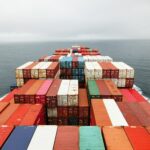Taiwan to loan Lithuania USD 1bn
Reading Time: 2 minutesTaiwan will extend a USD 1 billion credit line to Lithuania as a gesture of solidarity with the Baltic country, and to help to offset the trade embargo that China has imposed on it. The fund aims to develop Lithuania’s biotech, finance, semiconductor and satellite industries.
“We recognise and value Taiwanese investment plans in Lithuania,” Lithuania’s Economy Minister Ausrine Armonaite tweeted after speaking with Taiwan’s National Development Council Minister Kung Ming-Hsin on Tuesday. “Now it is very important to have a clear agenda that would lead to tangible results. Looking forward to the next steps!” she added. Chinese foreign ministry spokesman Wang Wenbin responded, however, that “the Taiwan authorities’ attempts to use dollar diplomacy to expand Taiwan independence activities are doomed to fail.”
Armonaite, undeterred, said local companies have already formulated plans to add to the microchip value chain. Reinvigorating Europe’s semiconductor business could prove timely, as auto and electronics manufacturers face a global microchip shortage. With a reputation as a tech heavyweight and home to electronics manufacture, Taiwan setting up manufacturing operations in Lithuania and neighbouring countries could help ease Europe’s semiconductor shortage. Taiwan’s National Development Council head Kung Ming-hsin said Czechia, Slovakia and Lithuania all expressed interest in cooperating on chip production after his official visits in October.
Lithuania’s first major show of solidarity to Taiwan came last May, when it left the “17 + 1” trade initiative between China and 17 Eastern European countries. Tensions then escalated in November, when China withdrew its ambassador to Lithuania in response to Taiwan opening a representative trade office in Vilnius, as the superpower does not recognise its Asian neighbour’s independence.
Taiwan last week announced plans to invest USD 200 million in Lithuania, in response to China expanding its blockade to include Lithuanian-made components that are part of EU supply chains. For its part, Lithuania is planning to open a trade office in Taipei in the spring.

